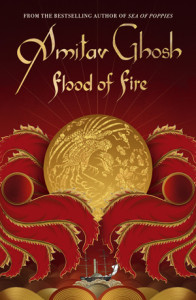 FLOOD OF FIRE
FLOOD OF FIRE
Amitav Ghosh
John Murray, May 2015, RRP $29.99; eBook RRP $16.99
Flood of Fire is the final book in Amitav Ghosh’s Ibis trilogy and concerns the first Opium War, the eventual Chinese defeat, and the seizure of Hong Kong by English forces. Sorry, um, spoilers I guess? It introduces some further new characters in Kesri Singh, the brother of Deeti, Bahram Modi’s widow Shireen, and Neel’s son Raju. We also catch up again with Zachary Reid, who’s had a bad time of it since last we saw him, after taking the fall for events at the end of Sea of Poppies.
I am rather glad I read the first two books in this trilogy before reading Flood of Fire. The books are excellent, but I’m not certain how well this third book would work as a stand-alone piece. I wouldn’t encourage reading it out of context, though you will still be rewarded with an interesting and superbly written story, with characters who are, if not all likeable, then believable within the ever so slightly exaggerated world of the story.
It was in reading Flood of Fire that I finally realised one of the subtler thematic streams of the story, and that is one of exploring different types of love. While the love stories in Sea of Poppies concern new love, and Sea of Smoke absent love, Flood of Fire brings us newly discovered love in the form of both a widow experiencing romance once more; the prospect of a father being reunited with his son; and the society wife Mrs Burnham’s reintroduction to her long-lost first paramour, amongst others. The novel illustrates elegantly how the passage of time can change feelings and personalities; not every reunion is a happy one.
The novel also tackles the difficult question of why Indian soldiers, themselves colonised, fought for England in overseas battles. This matter puzzles Chinese diplomats and is explored in Kesri Singh’s story. A sepoy with the East India Company, Kesri Singh volunteers to join the forces fighting in China and faces a crisis of identity there. For those who are at least passingly familiar with Indian history*, Kesri’s plotline also shows the seeds planted during the Opium Wars for the 1857 mutiny of East India Company sepoys and subsequent widespread rebellion.
An unexpected joy, for me at least, was the emergence of apocalyptic mythology in the story. This thread is brushed upon in Sea of Poppies, when the Hindu mystic Baboo Nob Kissin becomes convinced that Zachary is an incarnation of Lord Krishna. In Flood of Fire this theme is taken up again as Zachary decides he wants to become rich and turns down the path of avarice. This is accepted by Baboo as only appropriate, as the arrival of the British, the opium trade, and industrialisation are surely signs of the world’s entry into the Kali-Yuga, or Age of Apocalypse. Now, I’m not all that interested in participating in religion myself, but I’m really fascinated by apocalypse mythology. It’s really cool, okay? And slightly terrifying.
The conclusion of Zachary’s plotline is, intentionally or not**, a barb directed at white colonists and western values. Having adopted a white persona, Zachary takes on the white values of the free market, of profit before people, and of wanton destruction in the name of commerce. Given the disgusting conduct of colonial powers in the past, in the now, and probably into the future, Ghosh’s point seems completely justified.
Ghosh has concluded a marvellous trilogy with this moving and thought-provoking story. To be honest, I’m running out of things to say in its praise. Please go and read this book.
*I can’t say I’m all that familiar with Indian history, but I’m getting there.
**I am pretty sure it’s intentional.

